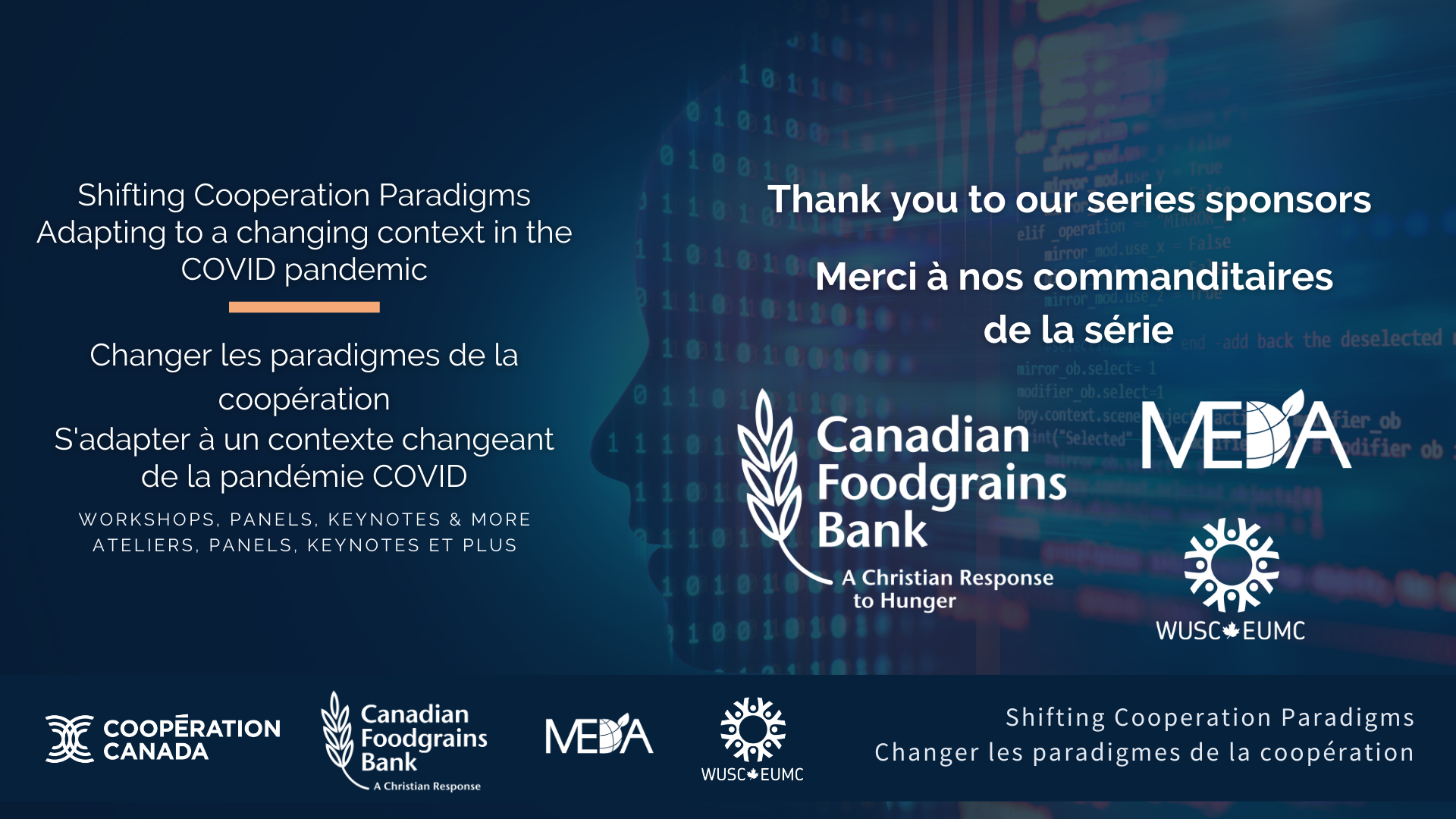Shifting Cooperation Paradigms:
Adapting to a changing context
in the COVID pandemic
Cooperation Canada’s Online Development Series of bi-weekly panels, trainings, workshops and networking events on trending topics!
Series Overview
Cooperation Canada is hosting bi-weekly, high-value virtual sessions, bringing innovative and challenging ideas to the international development sector in Canada. Diverse stakeholders will prompt thought-provoking discussions on topics related to the major trends affecting the international cooperation sector in a COVID-19 era. These sessions will help inform sector leaders about some of the issues they should consider as the pandemic crisis continues to impact the international cooperation sector. The series aims to:
- Inform Cooperation Canada member leaders (and others) of the key trends and issues facing the international cooperation sector given the pandemic crisis.
- Challenge Cooperation Canada members and others to proactively react and update their strategies and approaches considering the challenges facing the sector.
- Provide space for critical reflection and exchange through thought-provoking discussions by engaging leaders inside and outside the sector (moving beyond the ‘usual suspects’).

Price & Registration
Member rate
- $5/session or
- $20 for all 5 sessions in 2020
- (5 sessions for the cost of 4)
Non-Member rate
- $15/session or
- $60 for all 5 sessions in 2020
- (5 sessions for the cost of 4)
Student Rate
- Students / those struggling
- to pay can reach out for
- a reduced rate
Single Event Registrations
Personal Wellbeing and the International Development and Humanitarian Sector
Past Events
View past sessions
January 28: Personal Wellbeing and the International Development and Humanitarian Sector
From coping with first-hand experiences of disaster response, trauma and human suffering to personal stresses of overwork and burnout, international development practitioners, alongside front-line and social workers everywhere, face wide-ranging challenges to their personal wellbeing and mental health. In a sector that has struggled to provide for full duty of care for its employees and volunteers, approaches to personal and mental wellbeing are still poorly understood. Knowledge, resources and capacity are limited when it comes to supporting development practitioners’ personal wellbeing. The risks to personal wellbeing are further heightened in the context of lockdowns, changing workspaces, virtual communication and uncertainty produced by COVID-19.
On January 28th, Bell Let’s Talk Day, this webinar will focus on personal wellbeing as a critical component of team health and organizational success. Cooperation Canada is joined by members of the Wellbeing Project to discuss key issues of personal wellbeing for social sectors and international development practitioners, and to discuss resources and tools for practitioners.
Objectives:
- Overview of wellbeing (what it means, what it is, why it’s important)
- Practical ways to prioritize and support personal wellbeing in your workplace and within your organization
December 9: Change Leadership – Part 2: The People and Culture side of successful organizational change
In a COVID-era, operating contexts for CSOs are changing daily and leaders are grappling with important decisions to both manage risk and prepare for their next organizational opportunities.
Organizational change management is the systematic approach and application of knowledge, tools and resources to deal with change. It involves defining and adopting corporate strategies, structures, procedures and technologies to handle changes in external conditions and the business environment. Effective change management goes beyond project management and technical tasks undertaken to enact organizational changes. It also involves leading the “people side” of major change within an organization.
The primary goal of change management is to successfully implement new processes, products and business strategies while minimizing negative outcomes.
Part 2 of two sessions on change leadership will examine the people and culture components in managing significant organizational changes and common pitfalls to be avoided.
Moderator
Nicolas Moyer, President – CEO, Cooperation Canada
Panelists
Eric Gauthier, Directeur, Gestion du changement et Livraison RH, Ressources humaines et Communications, Desjardins
Desiree Paulsen, Organizational Development Practitioner, Tamarind Tree Associates
Benoît Hubert, President and Owner, PGF Consultants
November 25: Change Leadership – Part 1: Key steps and common pitfalls in managing organizational change
Click here for summary and highlights
In a COVID-era, operating contexts for CSOs are changing daily and leaders are grappling with important decisions to both manage risk and prepare for their next organizational opportunities.
Organizational change management is the systematic approach and application of knowledge, tools and resources to deal with change. It involves defining and adopting corporate strategies, structures, procedures and technologies to handle changes in external conditions and the business environment. Effective change management goes beyond project management and technical tasks undertaken to enact organizational changes. It also involves leading the “people side” of major change within an organization.
The primary goal of change management is to successfully implement new processes, products and business strategies while minimizing negative outcomes.
Part 1 of two sessions on change leadership will examine the key steps in managing significant organizational changes and common pitfalls to be avoided.
Moderator
Nicolas Moyer, President – CEO, Cooperation Canada
Panelists
Paloma Raggo, Assistant Professor of Philanthropy and Nonprofit Leadership, School of Public Policy and Administration, Carleton University
Wenjue Knutsen, Adjunct Associate Professor, Smith School of Business and School of Policy Studies at Queen’s University
November 12: Shifting Power; Direction and control as a key obstacle to localizing international assistance
Click here for summary and highlights
Moderator:
- Denise Byrnes, Executive Director, Oxfam QC
Panelists:
- The Honourable Ratna Omidvar, C.M., O.Ont., Senator for Ontario, The Senate of Canada
- John Clayton, Director of Program and Projects, Samaritan’s Purse Canada
- Lynn Eakin, Policy Advisor Ontario Nonprofit Network
October 28: Advancing the anti-racist agenda in international cooperation
Click here for summary and highlights
Moderator
- Gloria Novovic, Policy Analyst & GAC Departmental Liaison, Cooperation Canada
Panelists
- Odette McCarthy, Executive Director, Equitas
- Tiyahna Ridley-Padmore, Policy Advisor and a Diversity and Inclusion Committee Co-Chair, World Vision
- Suhani Bhushan, Diversity and Inclusion Coordinator, CIVICUS: World Alliance for Citizen Participation.
October 14: Shifting Power: localization and working with local partners, accelerating change in COVID-19 context
Click here for summary and highlights
- Moderator
- Peter Taylor, Director of Research, Institute of Development Studies
- Panelists
- Solange AM Kibibi, Co-Coordinator QAYN: Queer African Youth Network (QAYN) – Burkina Faso
- Jess Tomlin, Co-CEO, Equality Fund
- Michele Irving: Coordinator and founder POWA (Productive Organization for Women in Action) – Belize
- Larissa Fast, Research Associate, HPG/ODI Research Associate and Senior Lecturer, HCRI, University of Manchester.
- Ana Maria Mendez Libby, Country Director, Oxfam Guatemala
Sept 30: Building Back Better: Defining the building blocks for a just global recovery from the pandemic
September 9: Learning from Controversy: Effective approaches to international philanthropy and development
August 20: Liability, Duty of Care and Senior Leaders Responsibilities Training
August 18: Lessons learned regarding how the Government of Canada and its partners support women’s rights organizations
View the recording here at 1:01:45.



